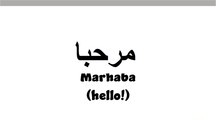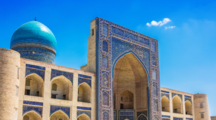Arabic

Top 5 Reasons to learn Arabic
1. A Widely Spoken Language
Arabic is one of the most widely spoken languages with over 350 million native speakers in the world. It is also one of the six official languages of the United Nations.
2. Expansion of Travel Horizons
The Arabic language would allow you to travel off the beaten track in over 20 countries around the Arabian Peninsula, the Middle East, and North Africa with much more ease and convenience.
3. A Distinct Language System
The written form of the Arabic language is an art itself. Its linguistic system is also an eye-opener with sharp distinctions between the semitic language and Chinese or English.
4. Growing Business Opportunities
With increasing China-Arab cooperation such as One Belt One Road and China-Arab States Summit, there are definitely better career prospects and more business opportunities.
5. Insights into Islamic Traditions
Learning Arabic grants us direct access to the Quranic text, allowing us to delve deeper into the wisdom of the second largest religion in the world and the first largest religion in the Arab countries.
Would you like to learn more about the Arabic language and culture? Enrol in our courses now and follow us on social media!
Instagram: https://www.instagram.com/european_hkuspace/
Facebook: https://www.facebook.com/hkuspace.european
YouTube: https://www.youtube.com/@europeanhkuspace7078
- Sort by
- Programme Title
The programme aims to introduce students to the basic elements of Arab culture and role of Islam in Middle East countries and enable students to grasp the very basics of the Arabic language including greetings and self-introduction, yet excluding the writing system. Besides, some core values and ethical concepts of Islam will be clarified, and students can raise their awareness of cultural differences between America/ western countries and Middle East countries in communication patterns.
Students are provided with brief geographical and historical background information of the Arab world, where the cultural varieties and regional differences are also touched upon. Through discussions and case studies, students will explore Islam, not only as a religion, but also as a way of life with reference to background information given at the beginning of the programme. Common misconception and stereotyping will also be highlighted with different perspectives considered. A site visit to the Kowloon Mosque will be organised to consolidate students’ learning.
The programme aims to introduce students to the basic characteristics of the Islamic economic system and enable students to understand some work- or business-related concepts in Arabic. Besides, students will be familiarised with general Islamic business etiquette. Furthermore, students will also raise their awareness of cultural differences between China and Middle East countries through different case studies.
On completion of the programme, students should be able to:
- elaborate on at least 5 characteristics of Islamic economic system;
- explain some Arabic work- or business-related concepts clearly;
- identify the dos and don’ts in business with Arab countries and apply them in their analysis or even business operation;
- analyse the cultural differences between China and Middle East countries.
Subscribe e-Connect











